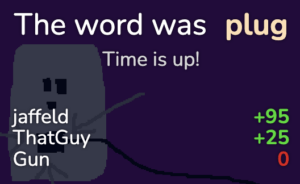For my competitive analysis, I chose to play Skribbl.io, an online multiplayer drawing guessing game. Skribbl.io goes for a very cartoony theme. This can be seen in the user interface and avatars that look hand drawn. Skribbl.io is similar to other drawing guessing games like Pictionary, except where games like Pictionary are team vs. team competition, Skribbl.io is multilateral competition. In the game, Players can either be the guesser or the drawer each round. The guesser’s goal is to guess the drawing before time is up and faster than everyone else. The drawer’s goal is to get as many people to guess their drawing before the time is up.

After time is up or once everyone has guessed the drawing, points are awarded to the players. More points are awarded to the guessers who guessed the drawing fastest and drawers can earn more points the more guessers that guess their drawing. The player with the most points wins after every player has drawn three times. The point reward system, timer, and hidden guesses are all mechanics that help create a competitive dynamic that results in a challenge aesthetic. However, some mechanics, specifically the point reward distribution and match making system, do not create a challenge aesthetic as well as they could. When it is your turn to be the drawer, the amount of points is reliant on the others being able to guess your drawing and the points awarded to the drawer for everyone guessing correctly is still less than the amount of points awarded to the last guesser.

This mechanic reduces the competitive dynamic because it does not provide an incentive for the drawer to draw well since they will not get many points to begin with. Skribbl.io should instead increase the reward for drawers that create good drawings. For example, drawers that get all the guessers to guess correctly could receive the same number of points as the person who guessed the fastest. Furthermore, the match making mechanic behind Skribbl.io reduces the competitive dynamic. When players reach the website, they are greeted with a large button that says “Play”. Clicking this button sends the player to an already active game. The problem with this mechanic is that players often join a game too late and are hundreds of points behind. Daniel Cook’s talk on Game Design Patterns for Building Friendships highlights the .io format of match making. However, in games like Agar.io and Slither.io, the games do not have a definitive endpoint. As a result, the formula does not work as well in Skribbl.io because the game officially ends after three rounds making large point disparities hard to come back from. Skribbl.io should instead implement waiting rooms so that the game starts when enough people have shown up. Finally, Skribbl.io does very little to limit the toxic language in their chat system. In one game I played, a player was able to harass the drawer with harsh language and making fun of the fact they did not speak english well. A quick fix to this could be to get censor a preset list of abusive language.



